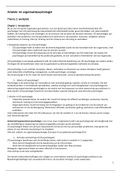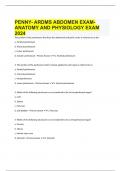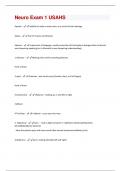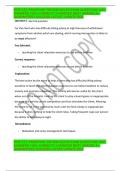Department of International Relations and International
Organization
INTERNATIONAL POLITICAL
ECONOMY OF TRADE
2019-20
Reading journal
Student name: Xanthe
1
, RECOMMENDATIONS
This reading journal contains specific questions to most of the required readings of the
course (typically two questions per reading). The reading journal is designed to help you
with the readings and to optimally prepare you for the exam. Preparing the journal is
your own responsibility. It is not formally assessed and no answer key will be provided.
But the content of readings are at the heart of the final examination. Understanding the
readings (as well as remembering the authors’ names!) is key to do well in the
exam. Furthermore, one section of the final exam will consist of a number of questions
that are very similar or identical to those in this journal. In that way, doing the
assignment carefully will improve your performance in the course.
You can complete this journal either on your own or work on it together in small study
groups. The advantage of working in study groups is that you can regularly discuss what
you have read and help each other clarify the texts. This being said, “dividing up” the
readings among members of your group is not a good idea. To perform well in the final
exam, you will need to do (and understand!) all required readings on your own. Thus, to
get the most out of the exercise, it is recommended that you write down your own
individual short written answers before you get together with your colleagues to discuss
them.
REMEMBER: the required readings consist of ±100 pages per topic/week. You are
expected to spend about 15 hours each week on doing the readings and answer the
questions in this journal (roughly 14 hours to do the readings and 1 hour to write down
your answers to the specific questions).
Last but not least: I hope you really will get something out of the readings. Most of them
should be fairly accessible and offer you new insights on some of the big questions
dominating international affairs today. Many of the things you have learnt in your other
courses over the last two years will come together in the material you will read and
hopefully help you understand the world we’re living in. So take this as an opportunity to
learn rather than just another “obligation”. And in that sense... enjoy!
2
, **********************************************************************
SESSION 1
Globalization and trade
**********************************************************************
Chang, Ha-Joon (2003). “Kicking Away the Ladder: Infant Industry Promotion
in Historical Perspective”, Oxford Development Studies 31(1), 21-32. (11
pages)
What does Chang mean by “kicking away the ladder”?
Developing countries are being pushed to adopt ‘good policies’ , which are conservative
macroeconomic policy, liberalization of international trade and investment, privatization
and deregulation. But, contrary to what is commonly thought, the developed countries
didn’t use these policies when they were in the process of developing, especially not in
the area of industrial, trade and technology policies: there is a discrepancy between
historical facts and today’s conventional wisdom. Kicking away the ladder refers to the
developed countries having made it to the top – which is being the developed countries,
but by enforcing those ‘good policies’ they are kicking away the ladder for the
developing countries in not providing them with the means that they themselves used
to get to the top. It does not mean that this is necessarily genuinely done, but it can also
just happen because of (misinformed) goodwill. The developed countries are thus
kicking away the ladder by having used certain policies to reach the top and now they
are there, not allowing the developing countries to use the same set of policies to do the
same. Therefore, the ladder used by the developed countries to reach the top has been
kicked away; the now developing countries cannot use it.
Do you find his argument convincing? Why (not)?
I do find his argument convincing. He clearly shows proof that the developed countries
really did use the more protectionist measures when developing and it shows how they
profited. However, I also think that the world right now is much different to when the
now developed countries were developing. The world is now much more focused on
trade in general and therefore I think that there might also be a sound logic behind the
good policies. While I do think that a certain level of protectionism can help countries to
develop, I also think that in this era where trade has increased so much and the
international economic system has changed a lot, the policies the developed countries
used might not really work in today’s world. For example, like the author shows, to
reach the same level of protectionism the developed countries did, the developing
countries would have to impose really high tariffs. I think this would backfire for the
developing countries.
Bhagwati (2007). In Defense of Globalization. Oxford University Press. Chapter
5 (“Poverty: Enhanced or Diminished?”; 17 pages). E-book is available via
Smartcat.
Why is free trade good for the poor according to Bhagwati?
Linsi:
- It allows international specialization
- It increases competition and thus efficiency cheaper and better products for
everyone
- It creates employment for low-skilled low-wage workers in developing countries
- It offers firms from developing countries to enter global value chains (industrial
upgrading)
- It can trigger ‘race to the top’ in environmental and labor standards.
His hypothesis states that: growth has to be the principal strategy for raising the
incomes, and hence consumption and living standards, of the poor. He relates this to
the fact that free trade leads to reducing poverty, because of the salutary effects of
increased demand for unskilled labor which the poor often can provide. Moreover, the
3
Organization
INTERNATIONAL POLITICAL
ECONOMY OF TRADE
2019-20
Reading journal
Student name: Xanthe
1
, RECOMMENDATIONS
This reading journal contains specific questions to most of the required readings of the
course (typically two questions per reading). The reading journal is designed to help you
with the readings and to optimally prepare you for the exam. Preparing the journal is
your own responsibility. It is not formally assessed and no answer key will be provided.
But the content of readings are at the heart of the final examination. Understanding the
readings (as well as remembering the authors’ names!) is key to do well in the
exam. Furthermore, one section of the final exam will consist of a number of questions
that are very similar or identical to those in this journal. In that way, doing the
assignment carefully will improve your performance in the course.
You can complete this journal either on your own or work on it together in small study
groups. The advantage of working in study groups is that you can regularly discuss what
you have read and help each other clarify the texts. This being said, “dividing up” the
readings among members of your group is not a good idea. To perform well in the final
exam, you will need to do (and understand!) all required readings on your own. Thus, to
get the most out of the exercise, it is recommended that you write down your own
individual short written answers before you get together with your colleagues to discuss
them.
REMEMBER: the required readings consist of ±100 pages per topic/week. You are
expected to spend about 15 hours each week on doing the readings and answer the
questions in this journal (roughly 14 hours to do the readings and 1 hour to write down
your answers to the specific questions).
Last but not least: I hope you really will get something out of the readings. Most of them
should be fairly accessible and offer you new insights on some of the big questions
dominating international affairs today. Many of the things you have learnt in your other
courses over the last two years will come together in the material you will read and
hopefully help you understand the world we’re living in. So take this as an opportunity to
learn rather than just another “obligation”. And in that sense... enjoy!
2
, **********************************************************************
SESSION 1
Globalization and trade
**********************************************************************
Chang, Ha-Joon (2003). “Kicking Away the Ladder: Infant Industry Promotion
in Historical Perspective”, Oxford Development Studies 31(1), 21-32. (11
pages)
What does Chang mean by “kicking away the ladder”?
Developing countries are being pushed to adopt ‘good policies’ , which are conservative
macroeconomic policy, liberalization of international trade and investment, privatization
and deregulation. But, contrary to what is commonly thought, the developed countries
didn’t use these policies when they were in the process of developing, especially not in
the area of industrial, trade and technology policies: there is a discrepancy between
historical facts and today’s conventional wisdom. Kicking away the ladder refers to the
developed countries having made it to the top – which is being the developed countries,
but by enforcing those ‘good policies’ they are kicking away the ladder for the
developing countries in not providing them with the means that they themselves used
to get to the top. It does not mean that this is necessarily genuinely done, but it can also
just happen because of (misinformed) goodwill. The developed countries are thus
kicking away the ladder by having used certain policies to reach the top and now they
are there, not allowing the developing countries to use the same set of policies to do the
same. Therefore, the ladder used by the developed countries to reach the top has been
kicked away; the now developing countries cannot use it.
Do you find his argument convincing? Why (not)?
I do find his argument convincing. He clearly shows proof that the developed countries
really did use the more protectionist measures when developing and it shows how they
profited. However, I also think that the world right now is much different to when the
now developed countries were developing. The world is now much more focused on
trade in general and therefore I think that there might also be a sound logic behind the
good policies. While I do think that a certain level of protectionism can help countries to
develop, I also think that in this era where trade has increased so much and the
international economic system has changed a lot, the policies the developed countries
used might not really work in today’s world. For example, like the author shows, to
reach the same level of protectionism the developed countries did, the developing
countries would have to impose really high tariffs. I think this would backfire for the
developing countries.
Bhagwati (2007). In Defense of Globalization. Oxford University Press. Chapter
5 (“Poverty: Enhanced or Diminished?”; 17 pages). E-book is available via
Smartcat.
Why is free trade good for the poor according to Bhagwati?
Linsi:
- It allows international specialization
- It increases competition and thus efficiency cheaper and better products for
everyone
- It creates employment for low-skilled low-wage workers in developing countries
- It offers firms from developing countries to enter global value chains (industrial
upgrading)
- It can trigger ‘race to the top’ in environmental and labor standards.
His hypothesis states that: growth has to be the principal strategy for raising the
incomes, and hence consumption and living standards, of the poor. He relates this to
the fact that free trade leads to reducing poverty, because of the salutary effects of
increased demand for unskilled labor which the poor often can provide. Moreover, the
3





